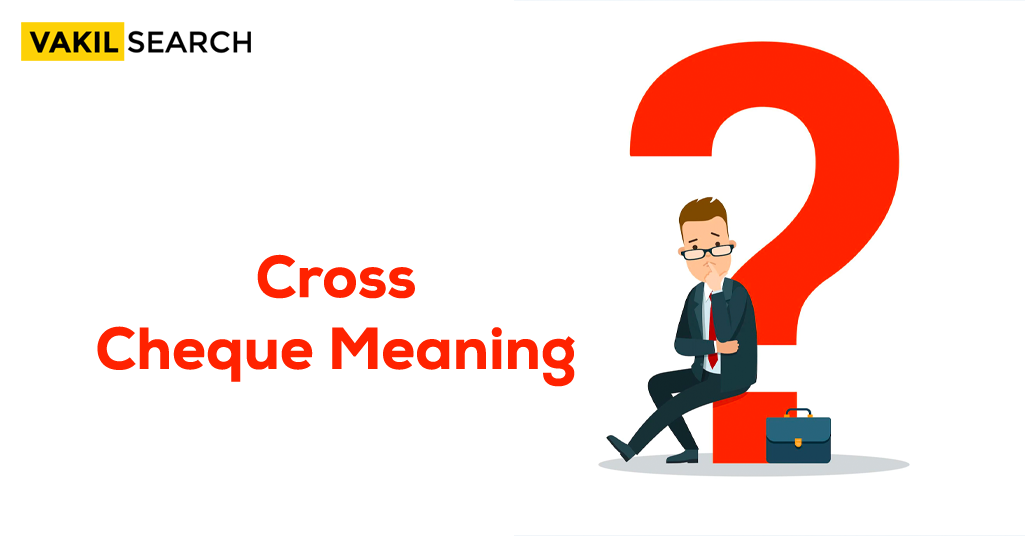A cross cheque is a type of cheque which is drawn on its bearer's bank, but bears the endorsement of another bank- this allows for a withdrawal from one account to be credited to an account in a different bank.
Cross Cheque Meaning
The meaning of cross-cheques in India is similar to the meaning of cheques in other countries. It is a document that allows two people to exchange money.
The Indian Commercial Courts are familiar with the Crossed Cheque and have ruled that original Cross Cheques can be recognized under any company’s seal and seals of any branch it has, irrespective of whether they bear the same figure or not. In other countries, a crossed cheque (also called a ‘crossed check’) is usually regarded as evidence of fraud.
History of the Cross Cheque
In India, the cross cheque is a popular financial instrument. Originating in England in the 16th century, the cross cheque is a drawing on two or more banks to settle a debt. The banks are usually not the original creditors, but middlemen who help promote and facilitate the payment. The middleman collects a commission from both the original creditor and the bank that pays out.
In India, crossed cheques are used mostly for commercial transactions such as buying and selling goods or making payments for services. One bank verifies the authenticity of a deposit made by another bank. Cross checks help to prevent money laundering and other illegal activities. Cross cheques are also used to redeem deposits with the banks. The cross cheque is usually a promissory note with a bank endorsement, and it is often referred to as a banker’s draft or banker’s cheque.
Although cross cheques are not used in large amounts in India, they have been adopted by some small businesses and traders for settling cash transactions. Cross cheques are typically issued by the head of firms or individuals who are unknown to law enforcement authorities but who may be involved in large scale money laundering activities.
Why Do You Write Cross Cheques?
Cross cheques are an important financial instrument in India. Cross cheques are used to move money between banks or to pay bills. They are also used as a form of collateral. Cross cheques can be used to pay for goods and services, or to borrow money from a bank. Cross cheques are also used as a way to protect against fraud.
How Does Cross Cheque Work?
Crossed cheque is a financial instrument that enables two or more banks to transfer funds between themselves. The cheque is drawn on one bank, payable to the bearer, and deposited with the second bank. The cheque can then be used as a means of transferring funds between the two banks. We have to Look for the Cheque bounce Case Filing Process if it Bounced Already.
Negotiable Instrument Act Says About Crossed Cheque
According to the Negotiable Instrument Act, of 1949, a crossed cheque is an instrument which is a negotiable paper order for the payment of money by one party to another.
Cross Payable Cheques to the order of the drawee. They are usually drawn on a bank or other authorised institution and are not subject to any discount.
The drawee may suffer a loss due to the non-acceptance of payment for the instrument. In the case of a crossed cheque, the bank is not liable to accept such an instrument as it could be rejected by the drawer or drawer’s agent as such because of non-acceptance. The bank will notify the drawee that there is no liability on its part and will request him to return the title to its document. Sometimes, this act gets challenged in court and some banks have slipped out of the terms and conditions of their deposits by issuing crossed cheque.
These are treated as dishonoured debts and come under attachment proceedings in courts. The banks generally accept the cross cheque as a receipt and fulfil their obligation in that they pay the amount of money to the drawee.
However, there are several cases wherein banks have detected dishonesty in making these cheques by the drawer or his family members/agents. In the case of a cross cheque, the bank needs to make a thorough enquiry about the person signing for such an instrument.
It should be noted that not all cross cheques are forged and many people do not even know about it until banks start enquiring about them.
Conclusion:
Cross cheque is a financial term that typically refers to an arrangement between two or more parties in which one party pays the other a sum of money by depositing the funds directly into their account.
Crossed cheque can be used for a variety of purposes, including business transactions and personal finances. To know more about crossed cheque, how to issue one, and the legal implications of issuing one, contact Vakilsearch today.

